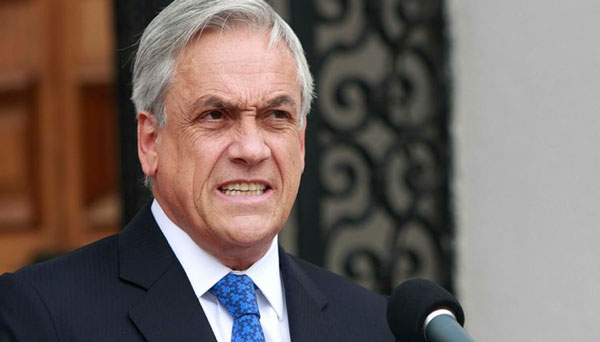
Santiago, Chile | AFP | After a week of huge and sometimes violent protests, Chileans are showing no sign of easing the pressure on a government that seems stunned and paralyzed by a popular explosion fueled by years of socio-economic frustration.
Seeking to negotiate an end to the crisis, President Sebastian Pinera on Saturday announced a sweeping reshuffling of his cabinet and said a highly controversial state of emergency could end as early as Sunday “if circumstances permit.”
Whether such moves will help take the air out of the protests that have brought much of the country to a standstill remains to be seen.
The public fury in Chile, one of South America’s richest and most stable countries, was touched off by a four-cent rise in ticket prices on the state-owned Metro system.
That seemingly innocuous change sparked angry clashes with security forces, widespread looting, and demonstrations that culminated Friday in Santiago with the historic mobilization of nearly a million people.
The protesters, if anything, appear to be gaining energy, and their list of demands has continued to grow, reaching far beyond the price of public transportation.
The demands now include decent retirement benefits, affordable health care and education, lower prescription drug prices… but also Pinera’s resignation and even the scrapping and replacing of the nation’s Constitution, which dates from the Pinochet dictatorship (1973-1990).
Between the calls for greater social justice and the demands for political transformation, “It’s hard to know which of these two dimensions will be the key to managing an exit from the crisis,” said Marcelo Mella, a political scientist at the University of Santiago.
But with more than a million Chileans taking to the streets nationwide — in a country of just 18 million — the protests are no longer limited to the demands of the country’s poorest.
“This social explosion includes some people who are very angry, but also — and this is unprecedented — there are demonstrators from more affluent neighborhoods,” said Genaro Cuadros, a professor of urban studies at Diego Portales University.
– Governmental paralysis –
From the beginning of the protests, President Pinera, in office since 2017, has been criticized for failing to grasp the severity of the crisis.
Security forces have been blamed for five of the 19 protest-related deaths so far, and government critics say a heavy-handed response has merely strengthened their resolve.
“Never has a government been so incompetent in handling a crisis that the police were not sufficient and we end up with troops in the street,” Cuadros said.
“The social explosion left the government stunned,” said Mella, adding that much of the political class shared that attitude.
Pinera’s decision to reshuffle the government came four days after he had announced a long list of social measures, including greater retirement benefits, higher taxes on the richest Chileans, a rolling back of the subway fare increase, and the postponement of a planned hike in electricity rates.
But, Mella said, “most of these measures just add to public spending and weigh on the state,” without addressing flaws in the Chilean economic model or dealing with inequalities.
Another challenge for the government, he said, is the absence of any clear leaders emerging from the protest movement, making it harder to negotiate a solution.
Chilean newspapers have compared the uprising to the “yellow vest” crisis in France, noting that French president Emmanuel Macron’s formula for calming the waters involved organizing a nationwide “great debate.”
– Painful memories –
By declaring a state of emergency when violence first erupted on October 18 and sending thousands of soldiers into the streets, the Chilean president sparked a furious reaction in this country where memories of a dictatorship that left 3,200 people dead or disappeared are still painfully fresh.
That sort of response should be the “last, or next-to-last taken by a government, but in Chile’s case, it was the first,” said Mella, who believes the nation’s leaders have fallen into a trap of their own making.
On Saturday, the military announced that a nighttime curfew was being lifted.
But with new violence a real possibility, the president’s room for maneuver appears limited, analysts say.
Mella believes the government will have to offer a “very aggressive” suite of reform measures and stand ready to engage in the “broadest possible political dialogue” if it is to placate the protesters.
– The costs of protest –
The economic costs of the week’s protests are serious: hundreds of supermarkets, shops and businesses have been looted or burned, the Metro system has suffered damage, leading to reduced service, and tourists have postponed or canceled their visits.
Local media estimate the financial costs so far at more than $900 million, directly affecting 400,000 employees.
But Chile is one of the region’s most economically stable countries, and consultancy Latin America Economics concludes that “while the human cost of the Chilean protests is growing, they are unlikely to impose a significant economic cost.”
The Santiago Stock Exchange has shown no signs of panic and the Chilean peso has remained stable.
 The Independent Uganda: You get the Truth we Pay the Price
The Independent Uganda: You get the Truth we Pay the Price


